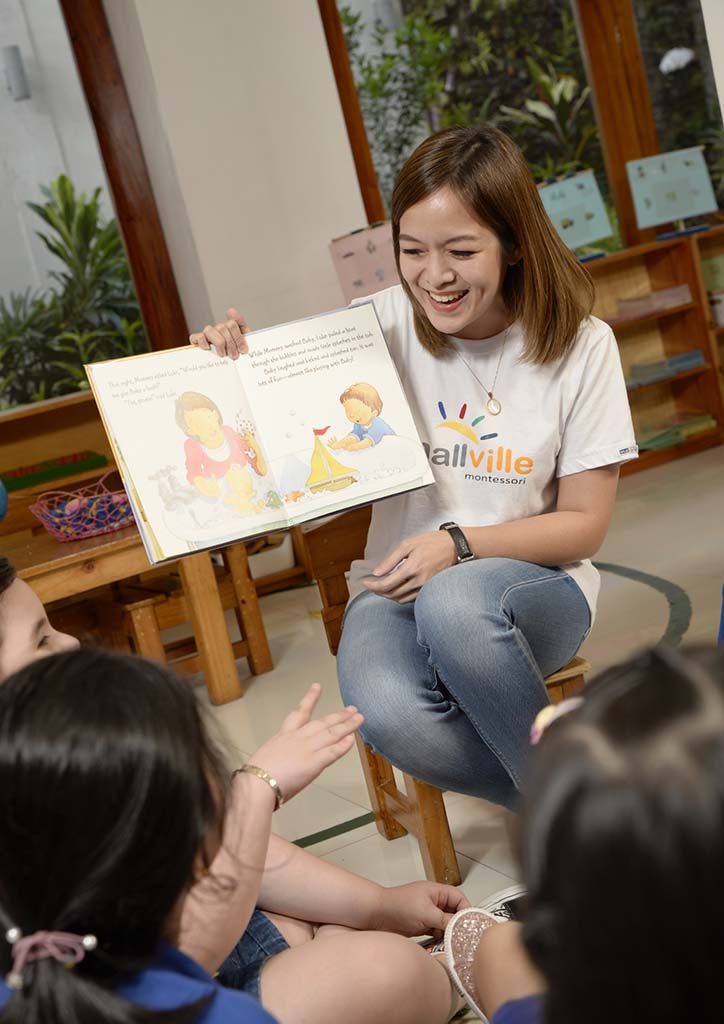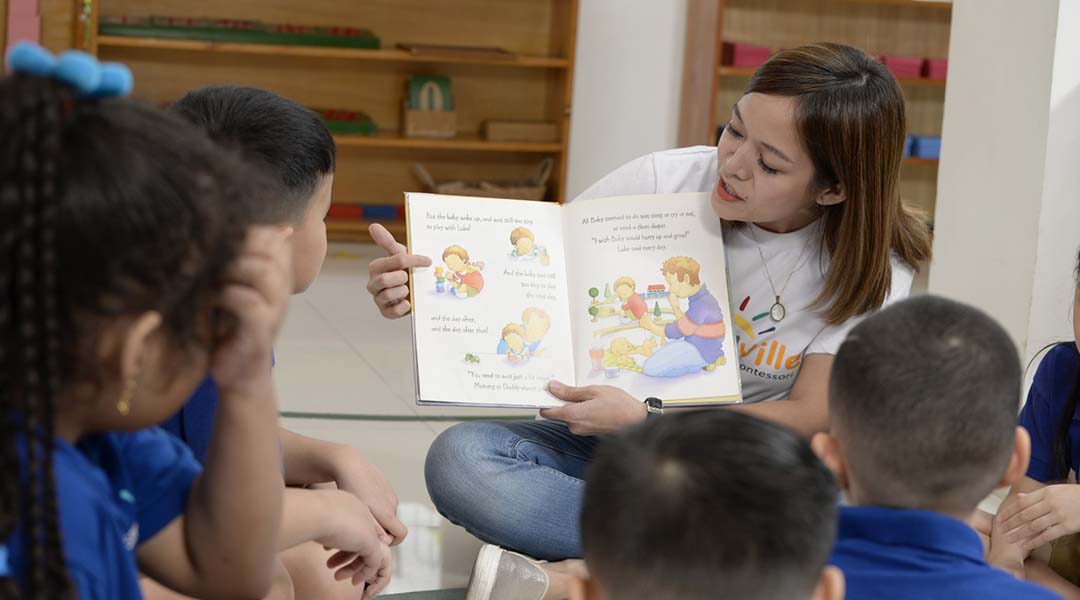Filipino Tradition and Gentle Parenting According to a Child Development Coach
We talked to an expert about Filipino traditions, gentle parenting, and its effects on children.
We’ve witnessed a rise in more modern moms veering away from traditional parenting styles and adopting a more progressive approach. Some moms have shared why they prefer gentle parenting, especially after growing up in a traditional Filipino household. And so to give us a bit more background on Filipino tradition and gentle parenting, we sat down with Bloss Villafuerte.
Bloss is the School Director at Smallville Montessori Circulo Verde. She’s also a development coach for parents and teachers and has been teaching children for over a decade. Moreover, she’s a strong advocate for aligning child development strategies at home and in school.

What is gentle parenting?
When asked about gentle parenting, Bloss defines it as a child-centered parenting approach. “It is a parenting style that establishes mutual respect between the child and the parent. With this approach, parents respect the child’s interests, choices, and readiness—rather than imposing or demanding expectations.”
How can modern Filipino parents practice this parenting style?
1. Be your child’s role model
Bloss shares that she often asks parents, “What kind of traits would you like your child to develop?” And she usually gets answers like patience, kindness, and compassion.
“When parents are clear with the traits they would like their kids to develop, it becomes their guide to what they should actually show the child. If you want your child to be patient, model patience at home. If you want him to be kind, model kindness. I believe modeling and establishing a positive environment is the first step to gentle parenting. Parents don’t force the child to wait and be kind. Instead, they give the child opportunities to observe and practice these traits.”
2. Give choices, not commands
“More often than not, children feel forced by commands which sometimes lead to a power struggle between the child and the parent,” says Bloss. “Providing choices empowers the child and gives him a sense of control. For example, you can ask, ‘Would you like to shower before or after you brush your teeth?'”
3. Less reactive, more responsive
“Young children often have big emotions that they cannot control, and sometimes adults can make quick judgments during certain situations. But with gentle parenting, it’s important to take a step back and really try to see things from the child’s perspective,” Bloss explains. “Remember: kids are still developing cognitively and emotionally. They lack the development and life experiences that adults have had. So we need to let go of our own biases and judgment and focus on the child.”
“When the child throws a tantrum, that’s your sign that your child needs your support. He’s not trying to give you a hard time, but he IS having a hard time. Gentle parenting creates that safe space for the child where you can help process his emotions and guide him into managing challenging situations or emotions.”
4. Avoid threats, bribes, or punishments
“These are fear-based parenting tools that can create resentment and rebellion. I often call these tools band-aid solutions that do not give room for character building or teach children valuable skills and traits such as problem-solving, patience, and respect,” says Bloss.
“Instead of using fear-based tools, it’s important to acknowledge and support the child’s feelings first. ‘I understand why this made you upset’, ‘I know this is difficult’, ‘Mommy is here to help you’. Closely look into what’s causing the behavior in order to know what the child needs and how he can be supported.”
“If a consequence is necessary, then the consequence must be related to the behavior and also show them how to do better. For example—if the child is breaking a toy, take it away. He cannot have it if he is not using it properly. Follow through by showing the child how to use the toy properly.”
Can gentle parenting align with Filipino tradition?

Because Filipinos tend to gravitate towards certain values, we asked if a gentle parenting style can work with traditional Filipino values.
“I think many of the parents today may have grown up in a more traditional environment where parents from the previous generations would mainly establish authority over children. There were also many dos and don’ts for kids back then and discipline was established in a more traditional manner such as spanking and time-outs. That being said, I think the traditional approach is very different from gentle parenting. Also because times are changing. Parenting children in a digital age means responding to different circumstances and needs, which leads us now to gentle parenting.”
“Unlike the more traditional approach, gentle parenting allows the adult and the child to become equals and partners. Parents take on a humble role of creating a safe space for the child—a space where the child will feel that his thoughts and feelings are heard and valued. Parents create a positive bonding experience with the child and become a support system. This kind of positive interaction becomes the child’s basis for future relationships and interactions in life.”
“While traditional Filipino family values and parenting styles have evolved and continue to evolve from one generation to another, I believe the values of respect, pakikisama, and love for family are upheld across generations.”
Does gentle parenting work on all kids?
“This parenting style will work on all kinds of kids because all children naturally seek love and connection with their loved ones. If both parents respect the child’s needs, validate his feelings, and provide opportunities for growth, then the child will reap the beautiful benefits of gentle parenting and carry that with him as he grows old.”
However, Bloss shares that there are some factors that may impede the effects of gentle parenting. Gentle parenting will not be as effective if:
- Parents are not open to unlearning and letting go of preconceived judgments and biases
- Learning opportunities are taken away from the child (e.g. parents make things too convenient for the child or do not let the child struggle on his own)
- Not all adults in the household are using the same approach
Is it too late to start gentle parenting if the child is older?

“I think it’s never too late to change parenting styles if parents are open to adapting to it. A new approach will have a better chance of working if it’s done with consistency and patience. If something does not work, I usually advise parents not to give up right away. Regardless of the child’s age, you need to give it time. You need to sow the seeds for gentle parenting first then allow it to bloom over time.”
“It’s also important to communicate the changes with the child. Clearly communicating with the child avoids confusion and sets up a partnership between the parent and child.”
Gentle Parenting and Filipino Tradition
For those who want to try out gentle parenting despite growing up with conservative Filipino traditions, Bloss advises staying humble and patient. “Gentle parenting is harder to practice during difficult situations. During these times, you can take a step back and ask yourself, ‘Will this make my child feel loved?’ At the end of the day, children may not remember what you said or did, but they will always remember how you made them feel.”
For more stories on parenting, check out these links:
10 Parenting Tips We Picked Up From Nico Bolzico’s Instagram
Intentional Parenting: Hayden Kho Futureproofs His Family of Three









